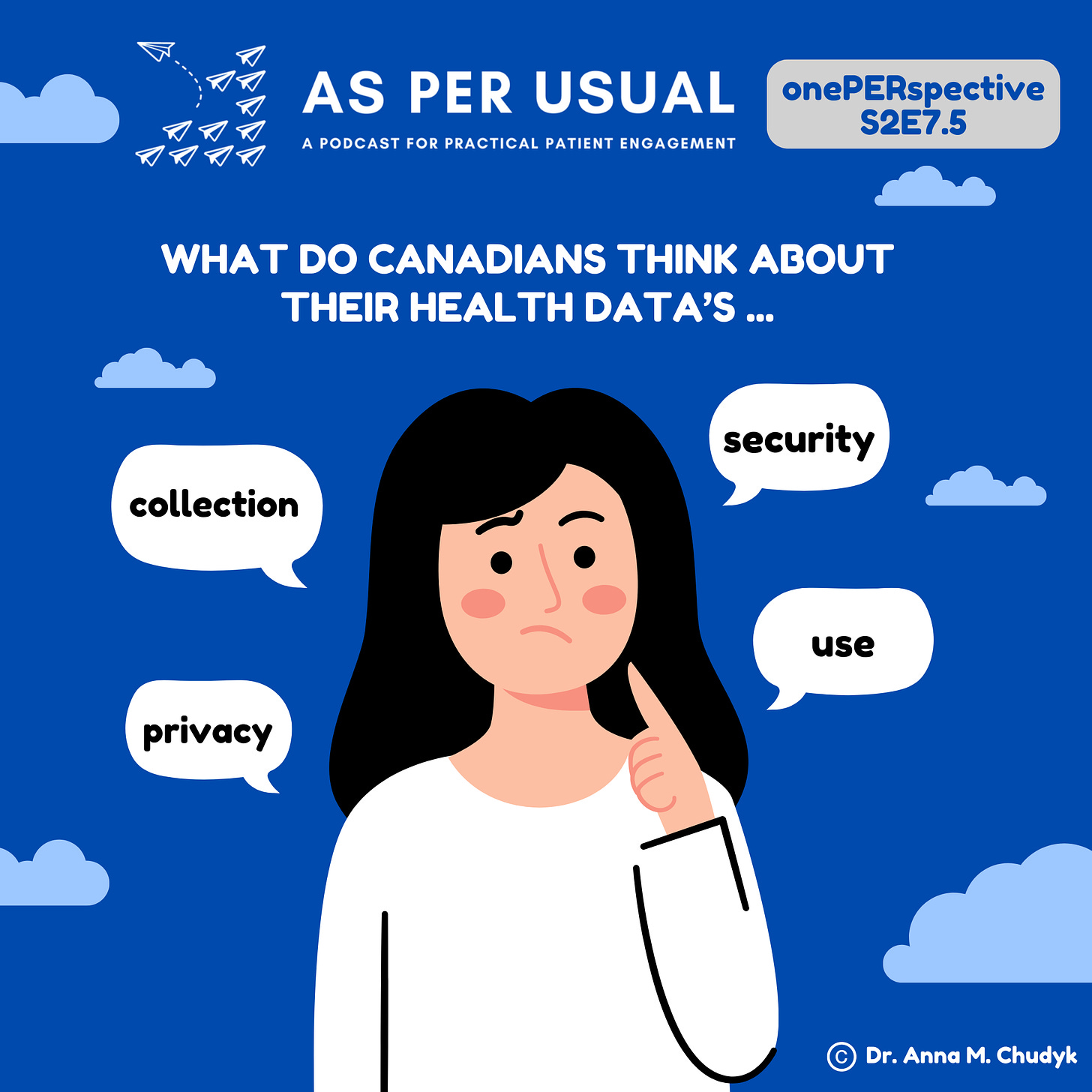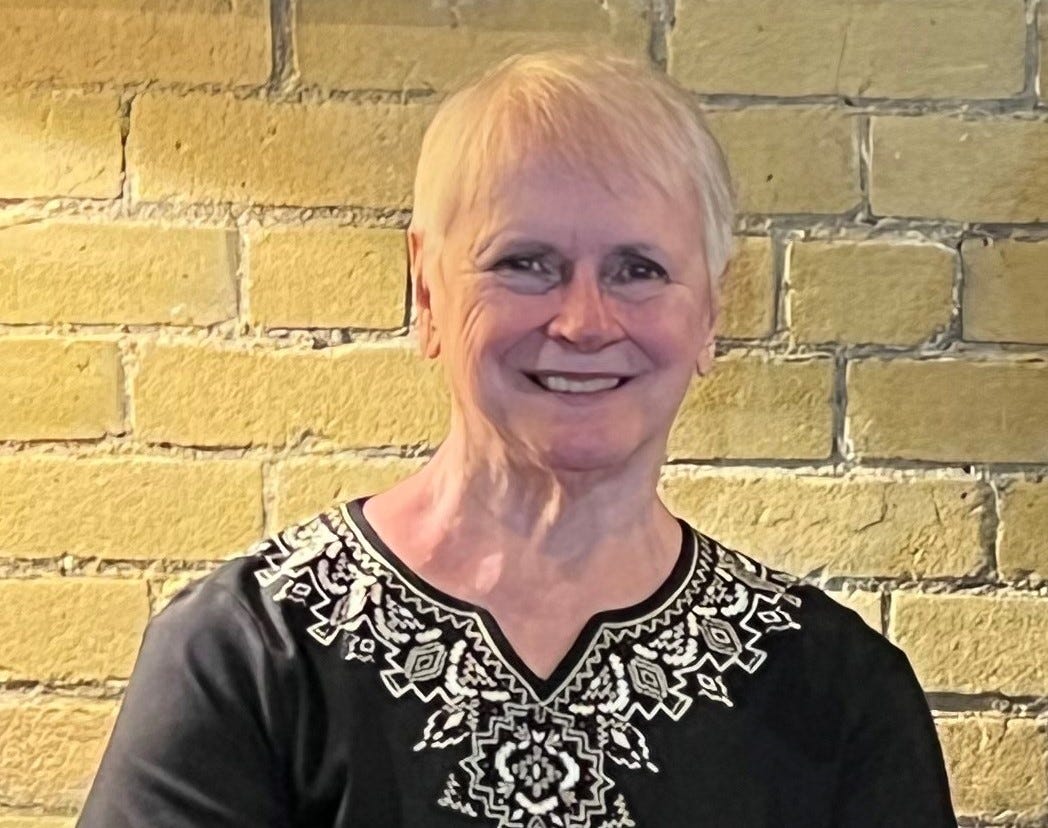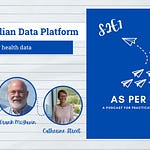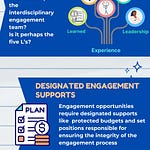Meet our guest listener
Kathy Smith: Kathy Smith is a cancer survivor and a cancer care partner actively engaged as a co-author in many healthcare research projects - including Anna M. Chudyk’s work on better understanding patient partners’ perspectives on engagement and exploring future directions for Canadian patient-oriented research. She is a patient research/awards reviewer for many organizations including the Canadian Cancer Society.
Episode Transcript:
Anna:
Hi everyone! Welcome back to onePERspective. A tri-weekly segment in which patient partner Kathy Smith shares a synopsis and key reflections from the previous week’s episode of asPERusual – a podcast for practical patient engagement. Today, Kathy will be recapping our episode that featured Catherine Street, Frank Gavin, and Kim McGrail from the Strategy for Patient-Oriented Research (or SPOR for Short) Canadian Data Platform. The platform is funded by the Canadian Institutes of Health Research – Canada’s national health research funder – with the aim of helping to create a multi-jurisdictional data access support system. Importantly, the SPOR Canadian Data Platform also does a lot of impressive work to engage Canadians in conversation about their health data, including how its collected, used, and applied to better health outcomes and create a more equitable healthcare system. So without further ado, take it away Kathy with your onePERspective.
Kathy Smith:
Thank you for that, Anna. In the previous six episodes, we have been introduced to patient facing engagement platforms funded by SPOR. This time, however, it's a little different. Catherine Street, Kim McGrail, and Frank Gavin share a clinician scientist facing SPOR platform, the Canadian Data Platform, or the SPOR-DP for short. Dr. Catherine Street described SPOR-DP's main function as to bring together multi-regional data for improvement, innovation and evaluation essential to a learning health system.
How does data collection intersect with patient collaboration? Frank showed us how patients do play a large role in helping shape the data platform by supporting research that focuses on patient identified priorities. SPOR-DP has a public advisory council. It's a forum where the public and the professionals, the policymakers and the researchers and the scientists meet to discuss issues around data collection, data sharing, and data access. I think everyone will agree that the number one data issue is transparency and trust. The less transparent the data collection and sharing processes, the less trust the public has in its information.
Other data deliberations surround:
the security of collection and safe storage of the data,
the equity of access to the data,
the types of data collected or missed,
the privacy and ownership of the data,
who controls the use of the data, and
who can benefit from the health care data collected?
What we all want to know is how do the data collected impact the health of people and or communities?
That's a tall ask of the patients and professionals on this program, but access to this pan-Canadian data repository can build a better understanding of priorities that are funding the research that moves science ahead and, as a result, better health care for all. I think that Frank zeroed in on one of our basic human instincts the why, the how, the when and the where. Curiosity. Curiosity is the driver of interest in data.
As a learning system, we all want to use data to make sure we are doing things that are helping address gaps, reduce errors and workloads, support underserved communities, and of course, do no harm. Like Frank, I too have experience with members of my family who face the inter versus intra provincial discrepancies in access to treatment and/or drugs. Perhaps pan-Canadian population studies with DP's repository hopefully will show policymakers the pressing need to reduce this error. No one should be denied access to treatment by virtue of geography or provincial boundaries. We do need a pan-Canadian management board to address this inequity. Yes, health care is a provincial jurisdiction. But once again, if the pandemic taught us anything, we go further, faster, better when we communicate and collaborate and share our findings as well as our resources. Sharing is caring.
The biggest takeaway for me from the SPOR Data Platform presentation is their laser focus on making data much more accessible to researchers and decision makers. Data is a powerful tool. The choice about how it gets deployed is ours because data drives decisions. A streamlined, simplified process for requesting comparable data from across the country will create new opportunities for researchers, says Dr. Kim McGrail, scientific director of the SPOR-DP.
Personally speaking:
If the pandemic taught us anything, it was that when we combine scientific and clinical with public expertise in a collaborative, interdisciplinary environment, we can move at warp speed to invent and apply new treatments and technologies. Can SPOR’s jurisdictional linkage of population level data, also known as Big data, be a game changer for health research and researchers?
SPOR combines a diversity of voices that span a variety of disciplines, geographies, cultures, and behavioral experiences with the scientific and clinical experts. This is a strong and powerful management strategy for the data platform.
I have heard it said you can have data without information, but you can't have information without data. Did we all watch the movie Moneyball, about the down and out Oakland A's baseball team? They took a chance on a statistician, Billy Bean, who collected and analyzed data on every player. At first, everyone laughed at that idea, but we all know the outcome — data management proved a powerful tool in sports. Can you think of any team that doesn't do that today? So we have a robust data management tool here in SPOR-DP and I'm glad we have a centralized data management system going on.
Anna:
Thanks so much Kathy. I always love listening to your key reflections and their applications to moving our health system forward. Something that I have been reflecting on since we shot and aired SPOR Data Platform’s episode is the importance of bringing patients and public into conversations about their health data, both to help direct, and address fears and uncertainties about, these directions moving forward. Nothing about us, without us, as you always say Kathy. And boy does this ring true here. The SPOR Data Platform definitely deserves to be commended for all of the patient and public outreach they embed into their activities.
Their work also makes me think of other great patient public outreach that we have going on in this space, like through the PXP – for patients, by patients – initiative led by my friend and asperusual season 1 guest Dawn Richards, which holds regular webinars that feature patients and the public talking about key issues related to patient engagement in research. It also makes me think of all of the great work that our friends at the Patients Advisors Network have been doing to help bring and support patients and the public into the patient engagement and healthcare advisor realms.
This actually brings me to our next episode, which will be airing on Monday, June 3. In it, the ever awesome Alies Maybe and Donna Rubenstein will be coming on to discuss the Patient Advisor Network’s recently released report titled, “Reimagining the Research Landscape.” The report is freely available if you go to patientadvisors.ca. I know that this episode is a bit of a sidestep from our season’s theme of focusing on SPOR-funded entities, but the report is affiliated with SPOR’s refresh activities and really brings to the forefront patient and public perspectives on the future of patient engagement and patient-oriented research in Canada. If this topic is of interest to you, then you should also consider reading a study that my colleagues and I recently published in BMC Health Research Policy and Systems titled, “Future directions for patient engagement in research: a participatory workshop with Canadian patient partners and academic researchers.” It’s free to read through the journal, so give it a Google.
Until next time, please be sure to check out our website (asperusual.substack.com) for resources from today's episode, and an interactive transcript from this and previous episodes. Please also remember to subscribe to this podcast through our website or wherever it is that you download your podcast episodes. While you’re there, if you take the time to leave us a positive review, it will help others find the podcast as well. Lastly, for those of you who'd like to contact me, please shoot me an email at anna.asperusual@gmail.com. Thanks so much for tuning in! Have a great couple of weeks! And until next time, let's keep working together to make patient engagement in research the standard or As PER Usual.












Share this post